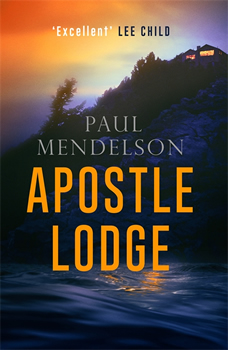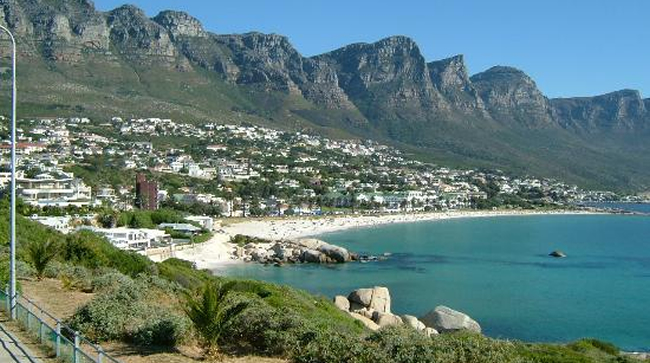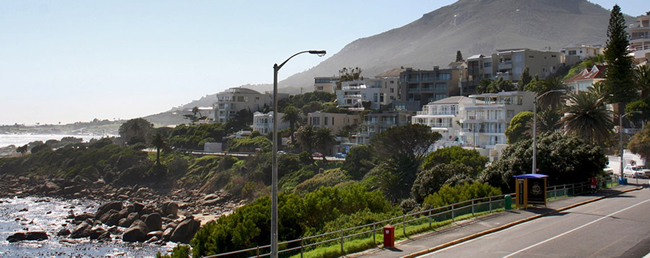

Africa Scene: Paul Mendelson
Engulfed in Turmoil
Paul Mendelson is a man of many talents: writer, interviewer, actor, script-writer for theatre and television. He is also an expert on bridge and poker, and has written more than a dozen books as well as regular newspaper columns about them.
Mendelson is passionate about South Africa and he’s been visiting Cape Town for 25 years, so when he decided to write a crime fiction novel, he chose Cape Town as the setting.
“The cultural and political background of the country is fascinating for an author and, despite my characters seemingly facing increasing problems, I remain optimistic for South Africa…” he says.
His debut Vaughn de Vries thriller—The First Rule of Survival—was described by Lee Child as: “An excellent, uncompromising crime thriller made even better by its setting.” The First Rule of Survival was an immediate success and was shortlisted for the most prestigious U.K. crime fiction award. It was followed in 2015 by The Serpentine Road and The History of Blood in 2016.
Last year the fourth in the series, APOSTLE LODGE, came out. A group of boys discover the body of a woman who seems to have been abused and then starved to death in an empty house, Apostle Lodge. Because of the circumstances, Vaughn immediately suspects that it’s not a single crime but part of a series. He finds it hard to attract the focus the crime deserves because a terrorist bomb blast has recently shaken Cape Town and the police are hunting for the perpetrators. As the cases progress, Vaughn finds himself sucked personally into both of them.
If you think serial killer thrillers are formulaic, APOSTLE LODGE will change your mind. It’s a very different and intriguing take on the subgenre.
Vaughn de Vries’ motivation is justice for the victim. That doesn’t make him an unusual detective, but the fact that it’s his only focus does—he’s not even concerned with the pain of the victim’s family, only in what they can tell him to help him solve the case. Was this where you started with him as a character? Does the rest of his personality develop pretty well inevitably from there?
When I read crime literature, I really enjoy series of books. I find the re-appearance of characters I know reassuring, and the development of the major characters over a long period of time to be fulfilling, in the same way that friendship builds, and you learn more about the person you are fond of.
This is really how it has been with Vaughn de Vries. He is a man engulfed in turmoil yet, strangely, he is at peace with it. In The Serpentine Road, he tells his boss: “You know me, sir: death gets me up in the morning.” He’s only partly joking. He has had twenty years of fulfilling marriage, brought up two daughters, been a policeman in the traumatic death-throws of apartheid heralding the brighter but still troubled times of the new South African democracy and, now he has found what he lives for. Not stability, not sex or alcohol—for which he has barely controlled, unhealthy appetites—but justice for victims. In one way, he is entirely happy in his work; in another, the new world disorients and frustrates him. I think, as the second decade of the new millennium rolls on with the political interference and the all-consuming corruption of the Zuma regime, he has become ever more blinkered, still more focused on that which absorbs him—the pursuit of justice. He just wants to work and be left alone. Perhaps President Ramaphosa will support the SAPS better?
APOSTLE LODGE is a serial killer story, but it’s quite unlike others I’ve read in the genre. The focus is the damage not only to the murdered victims and the ones who escape, but also to the profilers and others tasked with dealing with such psychopaths on a regular basis. What interested you in this aspect?
I think it is easy to forget that for every attack, every murder we write about, there are victims beyond the character portrayed: their family and friends, the police officers who deal with the crime. I have spoken with homicide detectives both in South Africa and in the UK and it is clear to me that these people’s lives have been changed irrevocably, that their work affects every aspect of their lives: their relationships, their ability to sleep, to relax, to fantasize, to engage with others. I have scarcely met a police officer who does not rely on some form of drug, be it alcohol, nicotine, recreational drugs, or sex addiction to get through their relentless shifts.
So I wanted to be mindful of this aspect of such an investigation. I think if you focus too much upon grief it can become relentless and wearing for the reader, but to ignore it would be doing the often invisible characters who inevitably inhabit such situations an injustice.
Grace Bellingham, a psychological profiler, is worn out by her exposure to stalkers, rapists and killers. At the beginning of APOSTLE LODGE she opines that perhaps evil is nothing more than a minute distortion of the human brain. However, the actions of the perpetrators is undoubtedly evil and their remorselessness and pride in their actions must be incredibly shocking. To live and work in their world takes a toll none of us can truly appreciate.
The serial killer is also rather different from others in the genre. Is he based on research or a real case, or did you invent this particular twisted scenario?
I am always interested in the undercurrents to the actions of criminals: their upbringing, the influences of their peer-groups, the catalyst which promotes such behaviour. The killer here is based on research and imagination, and is predicated on the idea that those with sociopathic tendencies often want to surround themselves with others who might be similar. Here, a man in a seemingly caring supervisory role might find himself subject to influence or perversion, or is it the other way around?
Psychiatrists and counsellors often tell their patients that their interaction is a two-way street, that they are not just helping their patient but gaining something themselves. Such exchanges of deeply personal beliefs, imagination, and information could, if those involved were so minded, develop into an ever-darkening spiral of horror, to be realized by one or both in the future.
The bomb blast in central Cape Town is dismissed as the work of rogue Islamist terrorists when no one claims responsibility, but many aspects of the crime don’t support that. Mike Solarin, a black policeman fast-tracked in the new SAPS, is part of the investigating team. He has the same commitment to the truth that drives Vaughn and it seems inevitable that they should join up for the climax and go it alone. Does Mike show that the disillusioned Vaughn will have heirs in the new generation after all?
I think that Vaughn is surprised, almost shocked, to discover another policeman—a young, black African policeman no less—who is prepared to put his career on the line for the pursuit of truth. Solarin is another man who cannot sleep easy knowing that there is a misappropriation of blame. He asks himself what the point would be of being a police officer if those around and above him do not subscribe to the law. Like De Vries, he sees compromise as the opportunity for evil to flourish, and he has decided that, excited as he is to have been promoted to an elite unit, he cannot let his own pride blind him to what he truly sees. There are a few men and women in the world who operate like this, publicly and privately—and it is they who often expose evil which would otherwise become pervasive and all-consuming.
I suspect that Mike Solarin (who is left in a precarious position at the end of APOSTLE LODGE) will be returning to the series…
Much South African crime fiction addresses the hidden agenda of the police brass and their government bosses. It runs through several of your books, and those of Mike Nicol, for example. Is this a natural outcome of a structure where the top leadership is taken over from outside the organization?
One would hope that it is not the natural outcome but, when you have a president who compromised, and then systematically destroyed, all the structures that might threaten him and those who supported him (see The President’s Keepers by Jacques Paux), it is unsurprising that the leadership of such bodies is regressive and corrupt.
What did we see here? A police force used to prop up and defend corrupt individuals and institutions? A force in part used to stifle dissent against the ruling political party? Existing elements—or newly created ones—to act as rogue units to destroy any viable opposition to the government? Attacks on the judiciary itself? If so, how is this different from the way the politicians of the apartheid era exerted control over dissent? This, surely, is worth commenting upon…
This is sunshine noir at its hottest! Cape Town is stricken by an unending heat wave and drought. The heat affects everyone, and makes it hard for Vaughn to sleep or function at his best. It’s sometimes said of a novel that place is a character. In APOSTLE LODGE, it’s the weather, and it complements the nature of the plot. Did you set out to make it the insidiously pervasive background in this way?
Simply, yes.
But also, I travel down from dark, damp, cold London to Cape Town at the end of November, to write the bulk of each novel over the subsequent ten weeks or so. The early summer weather has seemingly become hotter in the last few years, the water shortage was sign-posted a few years back, and the heat unquestionably makes it harder for people to work. Car engines strain to provide air-conditioning (or, in the case of my 50-year-old car, simply not to overheat), the jams get thicker and longer, frustration grows. Swimming pools are covered over, a shower becomes a luxury, everything seems to be that much harder to achieve. This is often how Vaughn feels as he pursues his investigations.
I love Cape Town—almost everything about it—and, for me, it is certainly a leading character in my books.
I gather that you are currently working on a standalone not set in South Africa. Will you tell us a bit about the new project? And will there be more books set in South Africa in the future?
For those readers who enjoy my books featuring Vaughn de Vries: he is coming back. He is in a difficult position by the end of APOSTLE LODGE, but I have a feeling that the fall of Zuma may ease his return somewhat…
My latest novel is set in the U.K., and it has been a strange, disorientating experience to be writing about a wet, cold winter in England, while enjoying the sunshine of Cape Town. Although London is my birthplace and home, I find it hard to enjoy writing about this city with anything approaching the pleasure I take from describing the Western Cape.
My detective is a Canadian immigrant, married, yet still in her own way, a loner. Her husband is a fire-fighter, dealing with what he sees as his fatal failures in dealing with a major incident. The mysterious disappearance of the wife of a controversial government scientist in the English countryside will test my heroine to the full, as she battles the London police, the universities and the government who sponsor her husband’s work, each of whom have reason for the truth to remain hidden.
- Out of Africa: Annamaria Alfieri by Michael Sears - November 19, 2024
- Africa Scene: Abi Daré by Michael Sears - October 4, 2024
- International Thrills: Fiona Snyckers - April 25, 2024





